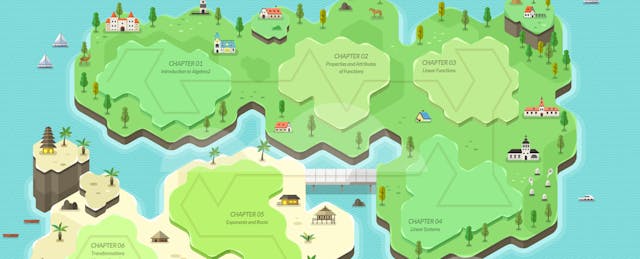Among the things that South Korea takes seriously: gaming (which The New York Times recently dubbed a “national pastime”) and education, where the after-school tutoring is an estimated $17 billion market and tutors can earn $4 million a year.
Put the two together, and you might find something like KnowRe, which has developed an adaptive math tool with game-like features for pre-Algebra, Algebra I and Algebra II. Today, the company announced it has closed a $6.8 million Series A round led by previous investor, Softbank Ventures Korea, with KTB Network Co., LTD, Partners Investment and SparkLabs Global Ventures also joining.
KnowRe spun out of an after-school math academy in Seoul in 2008, where tutors were matched with students to offer personalized instruction. But as the company grew, it re-directed its efforts toward building a digital program to grow the business.
“Personalization is not difficult” in practice, proclaims co-founder and co-CEO, David Joo. “It is really just a teacher and student working together. The difficulty is in scaling it and replicating that interaction between the student and the teacher.”
The startup joined SparkLabs, a Korean American tech accelerator, and moved to New York City in 2012. It raised $1.4 million in seed funding in January 2013. A month later, KnowRe released an open beta of its platform in the U.S., and currently sells directly to K-12 schools.
Many math companies claim to be “personalized” and “adaptive,” and KnowRe is no different. Key to the company’s technology, says Joo, is an emphasis on getting students to show their work. Every question is broken down into discrete steps so that the system can detect students’ mastery or deficiencies as they work through the problem. “The real crux of our technology is being able to identify the individual math concept that caused the student to answer incorrectly,” explains Joo. KnowRe assesses a student’s weaknesses and delivers that data to the teacher, while creating the appropriate curriculum for him or her to review.
“If you remember back to your middle school days, your teachers tell you to show your work,” Joo tells EdSurge. “They’re less concerned about whether you got it correct or incorrect, but whether you answered it in the correct way. We've taken that paradigm and digitized it.”
It was no coincidence that this focus on identifying knowledge gaps helped KnowRe take home the "Best Instructional App" award in the New York City Department of Education’s first "Gap App Challenge," according to Joo. "It was tremendous to get a third-party, independent group to validate our effectiveness."
KnowRe is chasing another award as one of 18 semi-finalists in the Robin Hood Foundation’s $5 million “College Success” prize for tools to help underprepared college students.
One of KnowRe’s most striking and polished feature is the game-like knowledge map, which may remind gamers who grew up in the 90’s of Civilization or role-playing adventure games. Students work their way through different areas of the map, each of which represent a math topic, and unlock new levels and paths with coins collected from completing exercises.
Critics of gamification often point to the use of extrinsic motivation (such as coins and badges) to drive student engagement. Joo says that, aside from the pretty map, KnowRe isn't focused on gamifying the learning experience. "In order to unlock new lessons, students have to spend coins. In order to earn coins, they have to answer questions," he says.
"Our goal is not to create a game that has an educational element. The real goal is to create a very sophisticated education program that has certain game-like elements.”
Joo declined to disclose KnowRe’s current traction in the U.S. market but did boast about a "very high organic conversion rate" of people who tried the tool and decided to buy. "We have a high percentage of sales that originates from the teacher and pushes it through the sales cycle." In one instance, the sales lead for a district purchase began with a student who tried the program and shared it with his teacher, who later set up successful classroom and school-wide trials.
The company also has a strong presence in South Korea, where Joo says it’s pursuing a business-to-consumer strategy through distribution channels such as after-school learning centers. With the funding, Joo is "thrilled" that his team to get to focus purely on distribution, customer service and product development. (Geometry curriculum is on its way, he says.) It's an encouraging sign as we wait to hear back on traction numbers.


